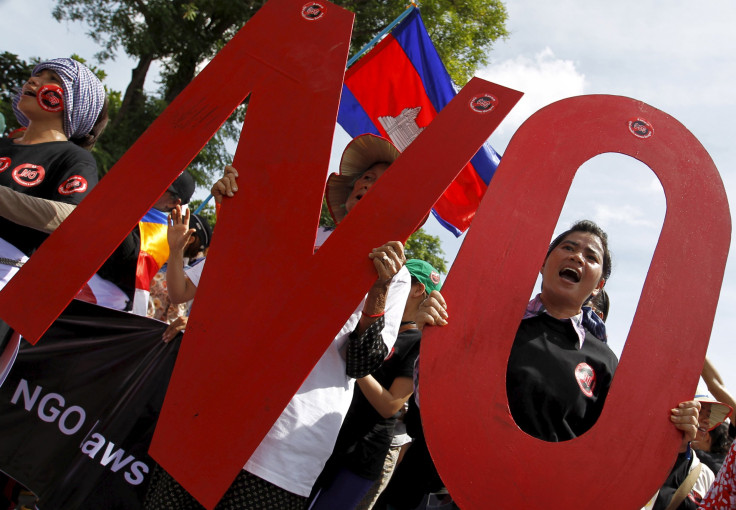Cambodia Passes Controversial NGO Draft Law Despite Protests, Boycott

Cambodia's government approved a controversial draft law on Monday that puts thousands of non-government organizations (NGO) in the country under heightened scrutiny. All 68 members of the ruling Cambodian People's Party (CPP) passed the measure after the opposition Cambodian National Rescue Party (CNRP) boycotted the vote, and despite days of protests and international criticism.
Riot police had barricaded the parliament building in order to hold back hundreds of protesters who called for the law to be scrapped, fearing that the government's move to crack down on civil society groups was aimed to suppress political opposition.
The Law on Associations and Non-Governmental Organizations grants the government sweeping powers to monitor and clamp down on civil society groups that are deemed a threat to national security.
"Before, we were not been able to control NGOs, on where their funding came from and how it was used," CPP lawmaker Nin Saphon told the national assembly, according to Agence France-Presse. "We need to have this law now."
A final draft of the bill was not released to the public, which has also drawn criticism. However, a draft copy obtained from lawmakers said that all NGOs must register with the government and espouse a politically neutral platform, the Associated Press (AP) reported. It also reportedly gives the government sweeping powers to block and unregister NGOs.
Phil Robertson, deputy Asia director of Human Rights Watch, reportedly warned that the law "will create an atmosphere of intimidation and self-censorship among NGOs who will realize that the Cambodian government will be able to shut them down at any time."
CNRP lawmaker Yem Bonharith said the ruling party had trampled their concerns, prompting them to boycott the vote. "We have given our suggestion, consultation in several commissions of the national assembly, requesting amendments and a delay in passage of the law to send back to executive body to review; but, we were ignored," he said, according to Voice of America. "So if we join the session, they won't listen to our debate and they would pass the law as it is, anyway."
The law has also drawn international condemnation. U.S. Ambassador to Cambodia William Todd reportedly criticized its lack of transparency and called for its text to be publicly released. The European Parliament warned last week that the proposed $700 million in aid to the impoverished country could be imperiled by the law and called for the government to withdraw the vote.
Previously, Cambodian Prime Minister Hun Sen's administration also threatened to expel the United Nations envoy to the country for "flagrant and unacceptable interference in the internal affairs of Cambodia," after U.N. agencies in the country called for greater transparency in the country's lawmaking process. The Southeast Asian nation is ranked among the world's most corrupt countries.
© Copyright IBTimes 2024. All rights reserved.





















